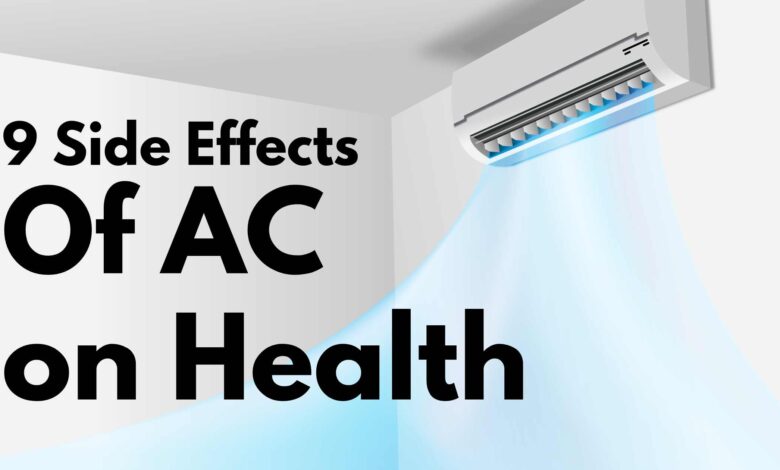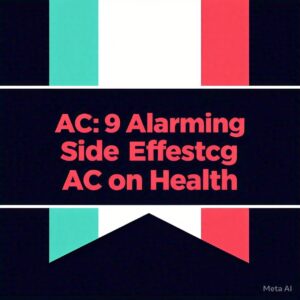

Air conditioners (AC) have become an essential part of modern life. It relieves the oppressive heat and creates a comfortable indoor environment. But despite its convenience, there are potential health effects that are often overlooked.
The effects of prolonged exposure to air conditioning can manifest in a variety of ways, from respiratory illnesses to skin disorders. This essay examines nine health side effects of air conditioning and emphasizes the importance of balanced use.
Table of Contents
Breathing Problems:
Constant circulation of cold, dry air in a conditioned space can irritate the airways and cause symptoms such as coughing, wheezing, and difficulty breathing. For people with pre-existing conditions such as asthma, such conditions may worsen their symptoms.
Dehydration:
Air conditioners remove moisture from the air, which can cause dryness. Prolonged contact with artificially cooled air can cause dryness of the skin, eyes, and mucous membranes, increasing the risk of dehydration, especially if you do not drink enough water.
Skin Problems:
Dry air from air conditioners strips your skin of its natural oils and can cause dryness, itching, and even dermatitis for sensitive people. Additionally, constant exposure to cold air can worsen conditions such as eczema and psoriasis.
Fatigue And Lethargy:
Staying in an overly conditioned space for a long time can disrupt your body’s natural thermoregulatory mechanisms and cause fatigue and fatigue. This phenomenon, known as “sick building syndrome,” can affect your productivity and overall well-being.
Respiratory Tract Infections:
Air conditioning systems can harbor and spread bacteria, viruses, and fungi if not properly maintained. This increases the risk of respiratory infections, especially in crowded or poorly ventilated spaces where pathogens can spread easily.
Allergies and Sensitivities:
Air conditioners circulate allergens such as dust mites, pollen, and pet dander indoors, which can worsen allergies and sensitivities. Additionally, mold growth in air ducts and filters can cause allergic reactions and respiratory illnesses for sensitive people.
Headache or dizziness:
Rapid changes in temperature, which are common in air-conditioned environments, can cause headaches and dizziness in some people. This discomfort may be due to the body having difficulty adapting to sudden changes in temperature.
Eye Inflammation:
Prolonged exposure to air conditioning can cause eye irritation, characterized by symptoms such as redness, itching, and dryness. This discomfort results from a lack of moisture in the air, leading to decreased tear secretion and subsequent eye irritation.
Extended exposure to air conditioning can lead to eye inflammation, marked by symptoms like redness, itching, and dryness. This condition arises from insufficient moisture in the air, which reduces tear production and consequently causes irritation in the eyes.
Extended exposure to air conditioning can result in eye inflammation, which is characterized by symptoms like redness, itching, and dryness. This occurs due to the lack of moisture in the air, leading to reduced tear secretion and subsequent irritation in the eyes.
Suppression of the Immune System:
Several studies suggest that prolonged exposure to air conditioning may reduce immune system function and increase susceptibility to infections and diseases. This effect is thought to be due to a combination of dry air and reduced exposure to outdoor pathogens, which play a role in regulating the immune system.
Also Read: Mango Leaves: 6 Amazing Health Benefits
Conclusion:
Although air conditioning reduces heat and humidity, the health effects cannot be ignored. Prolonged exposure to artificially cooled air can have a variety of adverse effects, ranging from respiratory problems to suppression of the immune system.
To reduce these risks, it is important to maintain appropriate humidity levels, regularly clean and maintain air conditioning systems, and balance indoor and outdoor activities. By prioritizing health-conscious habits, individuals can enjoy the comfort of air conditioning without compromising their health.




